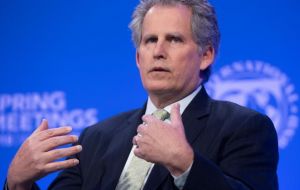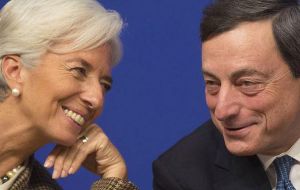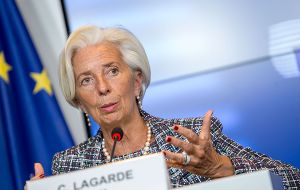MercoPress. South Atlantic News Agency
Lagarde's departure thrusts the IMF into an unanticipated search for a new leader
 The IMF board named IMF First Deputy Managing Director David Lipton as the fund's acting chief, expressing its “full confidence” in the American economist.
The IMF board named IMF First Deputy Managing Director David Lipton as the fund's acting chief, expressing its “full confidence” in the American economist.  Her appointment is subject to approval by a fractious European Parliament. If approved, she would take over as ECB president from Mario Draghi on Oct 31.
Her appointment is subject to approval by a fractious European Parliament. If approved, she would take over as ECB president from Mario Draghi on Oct 31.  Lagarde in a brief announcement said she was “honored” by the nomination and would temporarily relinquish her duties as IMF managing director
Lagarde in a brief announcement said she was “honored” by the nomination and would temporarily relinquish her duties as IMF managing director The nomination of Christine Lagarde as European Central Bank president on Tuesday has thrust the International Monetary Fund into an early, unanticipated search for a new leader amid a raging trade war that has darkened the outlook for global growth.
Lagarde in a brief announcement said she was “honored” by the nomination and would temporarily relinquish her duties as IMF managing director during the nomination period.
Her appointment is subject to approval by a fractious European Parliament. If approved, she would take over as ECB president from Mario Draghi on Oct 31.
Lagarde's second five-year term as IMF managing director is not due to end until July 2021. Last September, when asked by the Financial Times whether she was interested in the ECB job, she replied: “No, no, no no, no no.”
In a statement, the IMF board said it accepted her decision to temporarily step aside and named IMF First Deputy Managing Director David Lipton as the fund's acting chief, expressing its “full confidence” in the American economist.
The board statement provided no details about the search for a successor to lead the IMF.
But in Washington, speculation about possible candidates was already centering on Europeans that had been viewed as contenders for the ECB job, including Bank of Finland Governor Olli Rehn, French central bank chief Francois Villeroy de Galhau, Germany's Bundesbank President Jens Weidmann, and ECB executive board member Benoit Coeure.
Some analysts also suggested that Draghi, who will turn 72 before he leaves the ECB, could be a potential IMF candidate in a sort of job-swap with Lagarde, who is 63.
The IMF has traditionally been run by a European, while the World Bank, its sister institution also created at the end of World War Two, has been run by an American. At times, larger emerging market countries have sought to disrupt the duopoly with their own candidates.
But Mark Sobel, a former US executive director at the IMF and long-time Treasury official, said he did not see a deviation this time around, especially after US President Donald Trump's nominee to run the World Bank, David Malpass, was approved without a challenge in April.
“The duopoly is well in place,” Sobel said. “The Europeans didn't want to object to Malpass because they wanted to hang onto the IMF seat. The US is not going to object to someone that the Europeans put up.”
With 16.5 per cent of the voting power on the IMF board, the United States retains an effective veto over IMF decisions.




Top Comments
Disclaimer & comment rules-

-

Read all commentsCould we take this opportunity to get rid of the IMF all together?
Jul 04th, 2019 - 02:38 am 0That is an astounding amount of money they loaned to a country like Argentina.
Argentina would have been sunk without the IMF, and even with the IMF they've been sunk.
Should have just kept the 56 billion and the outcome would have been the same.
Abolish entire cornucopia of alphabet soup of global elite pretexts starting with the U.N..
Jul 04th, 2019 - 11:57 am 0Commenting for this story is now closed.
If you have a Facebook account, become a fan and comment on our Facebook Page!